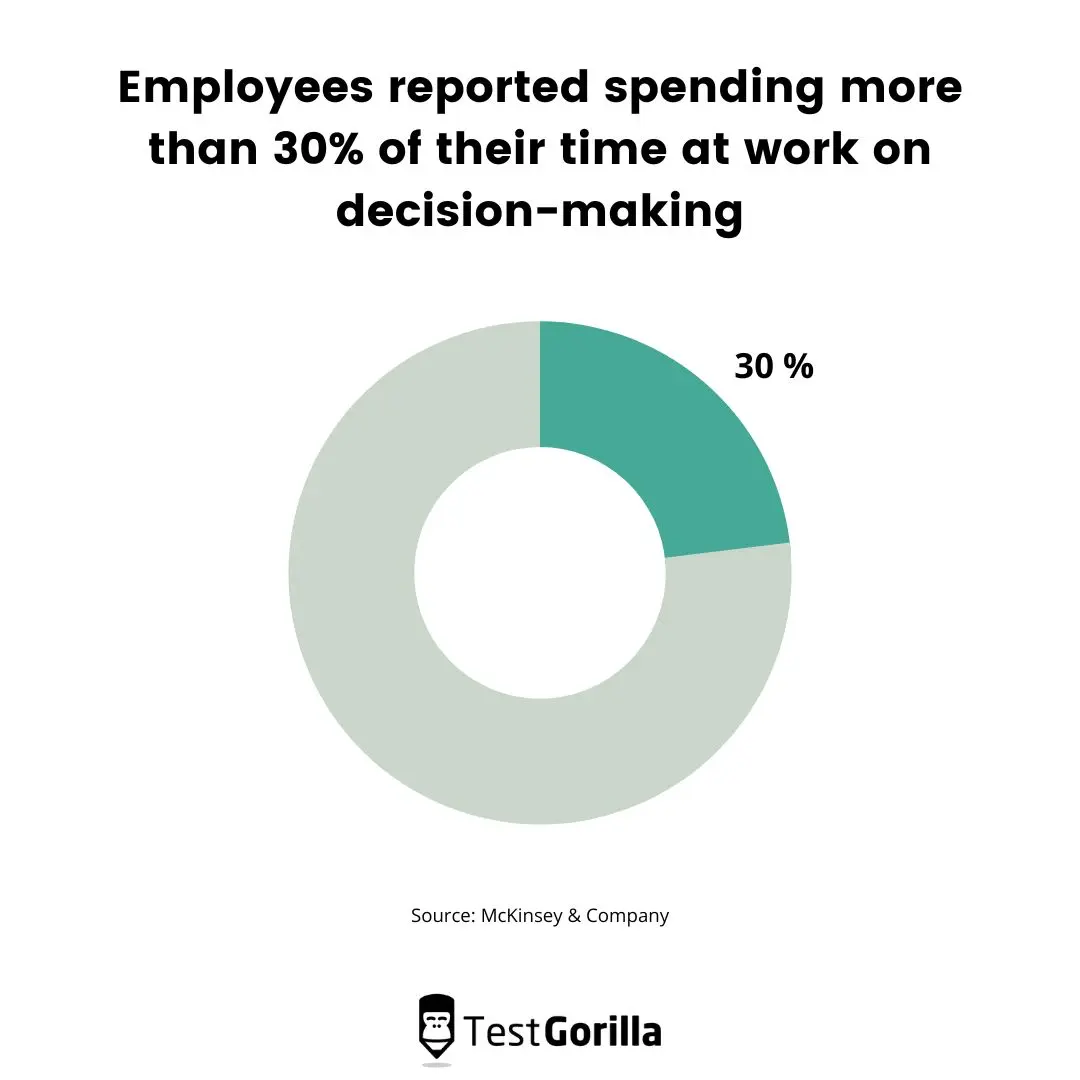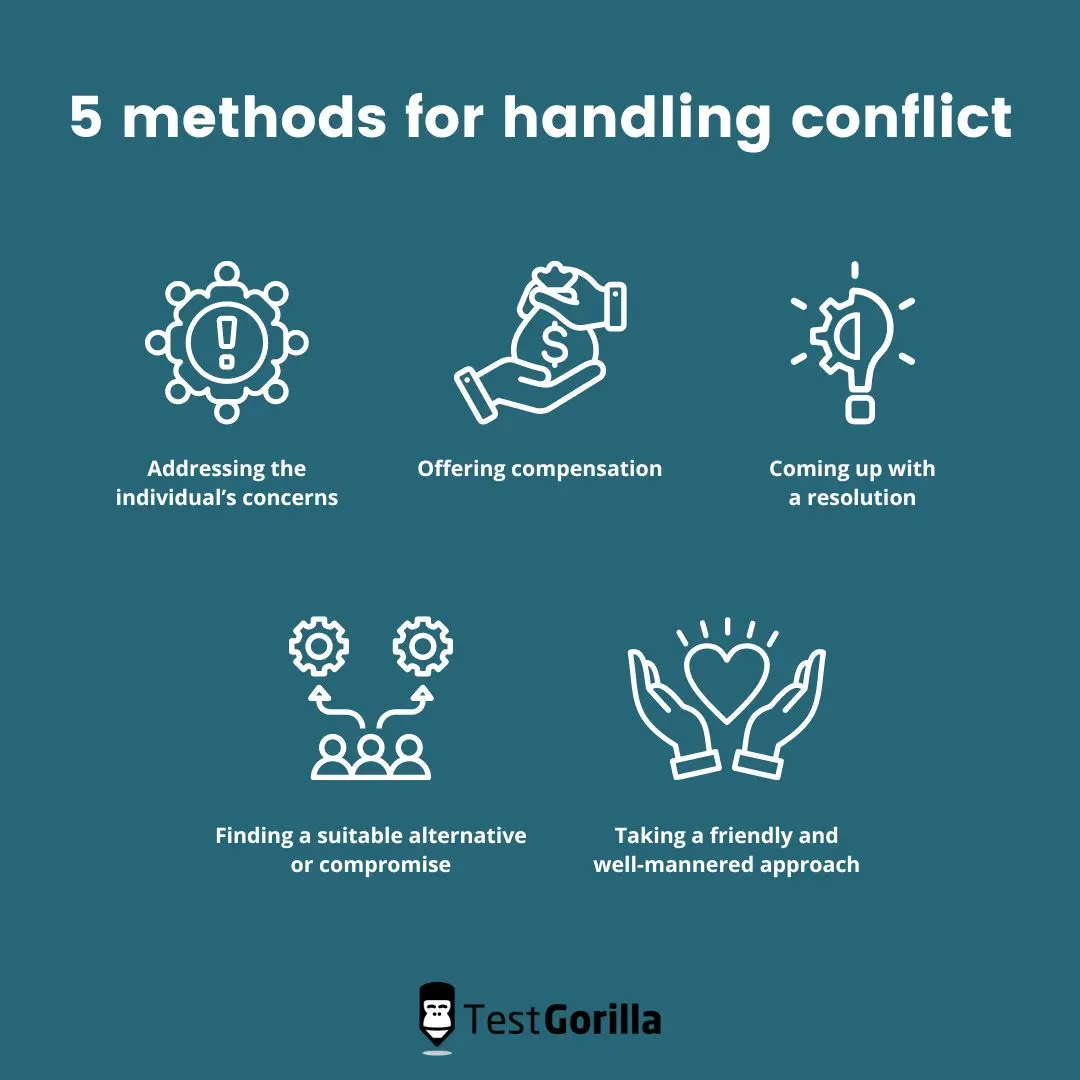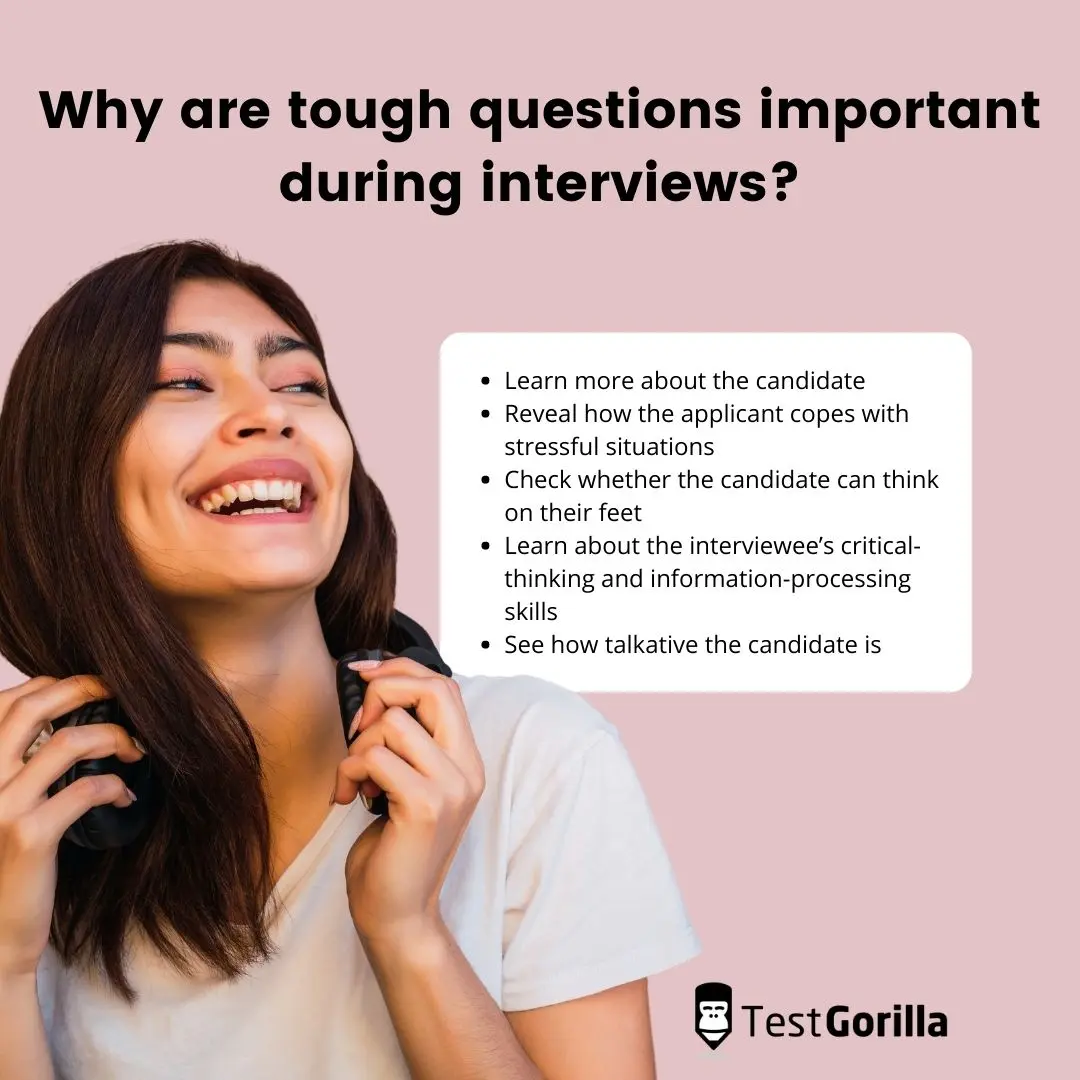Many hiring managers and recruiters need help understanding how well their candidates will perform under pressure once they start the role. Fortunately, there are some ways to test and challenge your prospects before they join your company.
By asking tough interview questions, you can see whether your candidates thrive under pressure or freeze in stressful situations. You can also use timed skills tests before the interview to ensure your candidates perform well and achieve excellent results under time constraints.
Keep reading to prepare for your next interview. We have provided a list of the 20 toughest interview questions to challenge your candidates.
Table of contents
- 1. Can you tell us a little about yourself?
- 2. What do you like about our company and the work we do here?
- 3. How do you expect your day-to-day to look in the position?
- 4. What are your greatest professional strengths?
- 5. What are your greatest professional weaknesses?
- 6. Why is there a gap in your employment history?
- 7. Why were you fired?
- 8. Why are you leaving your role?
- 9. Why are you switching career paths?
- 10. Do you have enough experience to tackle this role?
- 11. Provide some examples of when you had to make decisions at work
- 12. When was the last time you had to lead a team?
- 13. What are the most important factors in time management?
- 14. What skills do you have that you can bring to this position?
- 15. Provide some of your methods for handling conflict
- 16. Do you prefer to work independently or in a team?
- 17. What would you change about yourself or your personality?
- 18. What are you passionate about?
- 19. Do you consider yourself introverted or extroverted?
- 20. What’s your favorite movie, and why?
- Why are tough questions important during interviews?
- When should you ask tough interview questions during the hiring process?
- Use these tough interview questions to learn more about your candidates
1. Can you tell us a little about yourself?
If you want to ask a question that forces your candidate to think on their feet and improvise, this open-ended question will do the trick. Since there is no “right” answer to this question, your candidate will need to think about how they would like to present themselves to you on the spot.
The best candidates won’t flounder when you ask this question – instead, they will provide an effortless and conversational answer. Conversational skills and the ability to think on the spot are desirable qualities when recruiting.
The topics they discuss with you when telling you about themselves may include their family, hobbies, career history, and aspirations for the future. The longer and more engaging their answer, the better.
2. What do you like about our company and the work we do here?
This question will help you screen out candidates who aren’t passionate about your business. The most valuable applicants will already be familiar with your organization and be excited about the work you do.
Rather than simply asking what candidates know about your company, this question encourages them to provide their opinion on your work and what drew them to the opening.
A good answer will show that the candidate has an intimate knowledge of the business and a genuine interest in what you do. They should list a few of the company’s achievements and understand your company values and mission statement.
3. How do you expect your day-to-day to look in the position?
This question has no correct answer but will reveal what your candidate expects from the role. They should list the duties they expect to handle, indicating their familiarity with the role and its responsibilities.
You can follow up by asking the candidate which elements of the role they expect to enjoy and which they expect to struggle with. The interviewee will not expect the additional question, but their answer will help you think about potential training opportunities if you hire them.
By catching the candidate off guard and asking them to reflect on the job description during the interview, you can see how quickly they can think and perform in a high-pressure environment.
4. What are your greatest professional strengths?
Serious contenders should be able to advocate for themselves under pressure successfully.
They should list professional strengths that indicate a high level of self-awareness and an aptitude for self-improvement. These qualities will tell you how trainable your candidates are. The candidate can provide any answer to this question, from resilience under pressure to confidence and high performance.
Ask the candidate to give examples of when they showed these strengths. If you don’t push for examples, there is no way to understand whether your candidate is exaggerating their skills.
5. What are your greatest professional weaknesses?
Just as a candidate should be able to advocate for themselves, they must also recognize their weaknesses. Answers to this question will give you more insight into whether the candidate is serious about self-improvement and professional development.
To genuinely improve and advance themselves, your candidate must have the ability to honestly review their weaknesses and develop plans for mitigating them.
Push your candidate to explain their plan for accounting for their weaknesses. Their plans should be actionable and indicate a genuine desire for improvement.
6. Why is there a gap in your employment history?
Although this may seem like a tough question to ask your candidate, it’s important to know why there is a significant gap in their job history. It could be that your candidate took time off to care for a loved one or raise a family.
The right candidate will remain calm in response to this question. They will use it as an opportunity to explain their career journey, along with their commitment to rejoining the workforce.
7. Why were you fired?
If you know your candidate was let go from their last position, you should ask them why. This question provides the perfect opportunity for your applicant to show their capacity for self-reflection and describe areas in which they can improve.
It could be the case that their last business was struggling and had to cut some staff. On the other hand, if your candidate made significant errors in their previous position, they should emphasize their commitment to rectifying these mistakes and improving their approach.
8. Why are you leaving your role?
If your candidate is leaving an existing role to join your company, they should be able to provide you with a positive reason why. Their answer should focus on what they stand to gain from joining your organization rather than what their old position failed to offer.
Some examples of the perks candidates might be looking for include a change in scenery or learning more and furthering their career goals. A candidate with a positive response is likely a serious contender for your open role.
9. Why are you switching career paths?
If a candidate is making a drastic career change, it’s worth asking why. They should be able to explain why they wish to switch career paths.
Take note of applicants who list additional skills and experience they can bring to your business because of their unique career history. Sometimes hiring individuals with unique skill sets can work in your favor and help you expand the duties of the role you’re hiring for.
For instance, if you’re hiring for an HR role, and the candidate is a financial advisor, this could be considered a drastic career change. However, the candidate’s finance skills could help them handle employee payroll more effectively and develop less expensive time-tracking practices.
10. Do you have enough experience to tackle this role?
This question is a tricky one for your candidates. They will need to perform a self-assessment on the spot and be honest with their answer. Even if they lack formal experience, candidates should still advocate for themselves by listing their positive traits and skills.
If the candidate does have experience, ask them to provide examples and describe the skills they gained from these experiences.
11. Provide some examples of when you had to make decisions at work
More than half of respondents to a survey by McKinsey & Company reported spending more than 30% of their time at work on decision-making
.If you’re looking for a candidate who is comfortable taking charge and making executive decisions, ask them this question to gauge their leadership skills. They should be able to give an instance of when they made an informed decision.
They should explain the logic behind their decision and the factors they needed to weigh to make it. No matter how important the matter was, your candidate’s answer will still show their ability to make executive decisions.
12. When was the last time you had to lead a team?
If you’re hiring for a leadership role, you must find out if your candidate has experience leading, motivating, or training a team.
They should be able to provide a personal or professional example of when they showed leadership. It can be helpful to follow up this question by asking the candidate which qualities are critical for leadership.
13. What are the most important factors in time management?
Time management is essential for employees to work independently without requiring a lot of support from senior team members. They should be able to review their workload and prioritize effectively.
Ask your candidate to describe a few factors that inform time management decisions, such as the due date, project length, and schedule. If they provide several factors, they are likely competent in time management.
14. What skills do you have that you can bring to this position?
Your candidates should bring practical skills and experience to the job. When you ask this question, look for answers that match the job description.
Make a note of any candidates with skills and experience that extend beyond what’s expected for the role. Sometimes a candidate with unique skills and experience can benefit your organization in unexpected ways.
15. Provide some of your methods for handling conflict
Around 36% of employees have reported dealing with conflict often, very often, or all the time in the workplace
.If you’re hiring for a role that will inevitably involve conflict, such as a call center position, you must find out if your candidate will take a constructive approach to conflict. Your candidate should provide an answer with some of the following techniques:
Addressing the individual’s concerns
Coming up with a resolution to the problem
Finding a suitable alternative or compromise
Offering compensation
Taking a friendly and well-mannered approach
Any of the above answers are acceptable – but it’s best if your candidate can supply more than one.
16. Do you prefer to work independently or in a team?
There is no right answer to this tough interview question. However, you should push your candidate for a definitive answer since it’s important to understand their working style.
This question will prompt them to define the work environment in which they thrive. If their description aligns with the position, it improves the chances that they will be content in the role.
For example, if you’re hiring a software developer who will work in a team environment, consider whether your candidates have experience working in teams.
17. What would you change about yourself or your personality?
This toughest interview question is hard to answer, but responses can reveal a lot about the candidate. For instance, your candidate might tell you about a physical insecurity they have.
Or they may decide to share that they are chatty or overextend themselves. This question could result in a work-related response or simply help you get to know your candidate better on a personal level.
18. What are you passionate about?
If you ask your candidate this question, you’ll gain insight into their interests in and out of work. Answers to this question will also show you how talkative your candidate is, which can be an important factor in client- or customer-facing positions.
Some candidates may discuss side projects that they’re passionate about, such as application development or blogging. Others may reveal interesting skills they have by mentioning their personal projects.
No matter the answer they provide, they should be enthusiastic and have a relaxed demeanor when talking. Their answers will show how comfortable they are in conversation.
19. Do you consider yourself introverted or extroverted?
If you’re hiring for a public speaking role or a position that requires plenty of face time with other employees, this question is fundamental. If your candidate is applying for a remote position oriented around completing projects and tasks, their introverted nature might align well with the role.
Ideally, your candidates’ traits will match the role and company. But even if they don’t, it may not be a problem if they can adjust to the working environment.
20. What’s your favorite movie, and why?
As with the previous question, this tricky question will encourage your candidate to open up and be talkative. Their favorite movie will tell you something about their interests and personality – and their answer’s length, depth, and engagement will reveal how sociable they are.
An ideal candidate for a customer-facing role will have invested time into improving their communication and conversational skills. It can be a great idea to ask this question at the beginning or end of the interview to add a lighter note.
Why are tough questions important during interviews?
If you think it’s harsh to ask your candidates some tough interview questions, consider why these questions work. Here are just a few of the benefits of asking tough interview questions:
Learn more about the candidate
Reveal how the applicant copes with stressful situations
Check whether the candidate can think on their feet
Learn about the interviewee’s critical-thinking and information-processing skills
See how talkative the candidate is
Responses to tough interview questions will help you to analyze all of these qualities in your candidates to see which ones show the most promise.
When should you ask tough interview questions during the hiring process?
When you begin the hiring process, you should refine your list of candidates to ensure you’re only inviting the most promising ones to an interview. Interviews can be time-consuming, so you must ensure your candidates are strong contenders.
To narrow down your list of interviewees, consider implementing skills assessment tests to evaluate their competency. You can choose from various skills tests to evaluate the knowledge and abilities required for the job. For instance, if you’re hiring a technical writer, you can assess candidates’ CRM or SEO writing skills.
Once you have narrowed down your list of candidates, evaluate them further in the interview process by asking them tough questions. You should make your candidate feel relaxed and at ease during the initial phase of the interview before applying pressure.
You can maximize what you learn throughout the interview by asking tough questions. Compile a list of tough interview questions for your next batch of candidates, and look for other questions related to the specific skill set required for the role.
Use these tough interview questions to learn more about your candidates
Now that you know why tough interview questions are so important, you can begin preparing for the interview process. At TestGorilla, we offer skills tests to help you rank your candidates and invite the most skilled applicants to an interview.
If you’re looking to improve, enhance, or refine your hiring process, why not take advantage of a 30-minute demo with the TestGorilla team? Our experts can help you create more efficient and accurate hiring processes to ensure you get the best person for the job.
Use these tough interview questions to apply pressure and see how well your candidates cope with stressful situations.
Related posts
Hire the best candidates with TestGorilla
Create pre-employment assessments in minutes to screen candidates, save time, and hire the best talent.
Latest posts
The best advice in pre-employment testing, in your inbox.
No spam. Unsubscribe at any time.

Hire the best. No bias. No stress.
Our screening tests identify the best candidates and make your hiring decisions faster, easier, and bias-free.
Free resources
This checklist covers key features you should look for when choosing a skills testing platform
This resource will help you develop an onboarding checklist for new hires.
How to assess your candidates' attention to detail.
Learn how to get human resources certified through HRCI or SHRM.
Learn how you can improve the level of talent at your company.
Learn how CapitalT reduced hiring bias with online skills assessments.
Learn how to make the resume process more efficient and more effective.
Improve your hiring strategy with these 7 critical recruitment metrics.
Learn how Sukhi decreased time spent reviewing resumes by 83%!
Hire more efficiently with these hacks that 99% of recruiters aren't using.
Make a business case for diversity and inclusion initiatives with this data.




















